#Pointe de Saint-Pierre
Explore tagged Tumblr posts
Note
Sexy ratings on all the members of the 3rd Committee?
Let’s see..
Bertrand Barère – I did threaten to have him executed once. That should tell you everything you need to know. Honestly, I should have followed through.. Smirks too much. Tries too hard. 2/10 but only if you’re blind and like being lied to.
Jacques-Nicolas Billaud-Varenne – Might genuinely hiss if you tried to touch him. No. Also: Collot. 1/10.
Lazare Carnot – No. No. Absolutely not, I spit in his direction. Traitor. I’d rather kiss the guillotine. 0/10, and that’s generous.
Jean-Marie Collot d’Herbois – You’d have to pay me. You’d have to pay me and tranquilize me and even then I’d still say no. Also, I hope he stubs his toe every day for the rest of eternity. 0/10
Georges Couthon – Couthon is sweet. He’s cute. He makes little sarcastic remarks and has that soft face. But sexy? Not when I’ve watched him use Maxime’s shoulder as a pillow. 5/10 in a nice way!
André Jeanbon Saint-André – Religious.. Yes.. But, I definitely overheard him being called ‘Father’ once and it did something to me. I’m trying not to think about it. 7/10.
Robert Lindet – Looks like a wet sock (an attractive wet sock?).. I forget he exists sometimes and that should tell you something.. But, eh.. He’s got that quiet, bookish appeal. He’s no Hérault, but there’s a charm. 4/10
Pierre-Louis Prieur – Has that ‘stern schoolmaster’ kind of quality, which I’m not really into unless I’m already in trouble—and I am usually in trouble. He’s fine. 3/10 because he was against us.. but honestly.. if I was docking points for that alone.. We’ll just go with–his hair’s too neat.
Claude-Antoine Prieur-Duvernois – This one’s the engineer, right? A bit too obsessed with logistics to be sexy, unless you're into being out-scheduled. Also, looks like he'd judge how you moaned and then file a report about it. 4/10. Nice(r) hair, though!
Maximilien Robespierre – My brother. Neexxttt!
Louis Antoine de Saint-Just – Angry. Beautiful. Medium length brown hair.. 7/10, However, I already have one of those and his name is Napoleone. I’m not collecting duplicates.
Jean Hérault de Séchelles – Somebody’s going to have to rip me off of him, don’t tell anybody I said that, he’s still an aristocrat. 9/10, no further comment.
43 notes
·
View notes
Note
Name, hobby and quote for Gia, Bobbi and Cusi? :3
NAME: What does your TWST OC’s name mean? Why does Rook/Floyd call them [insert nickname?]
gia yugo
‘gia’ has its roots in italian from what i could see, with the meaning ‘god is gracious.’ it wasn’t on purpose, but the irony isn’t lost on me. i actually didn’t pick the name for its meaning, but rather because when making ‘sonas’ or at the very least ocs that started out as ‘sonas’, i will try to give them names that start with the letter ‘g.’ gia is also a name i’ve been wanting to use ever since i’ve worked with a fellow genderqueer coworker named gia, i just really liked the name and it stuck. ‘yugo’ on the other hand is straight up the spanish word for the wooden frame typically on the backs of oxen, used to carry heavy burdens. hardy har har. it also had the added bonus of starting with the ‘yu’ sound.
i opted to keep the in-game yuu floyd nickname ‘shrimpy’ and actually centered gia’s hairstyle around it so that it made more sense in-verse as to why they get the name, as instead of darting away from him when floyd approaches, they don’t do anything as floyd playfully tugs at their ‘hair antenna.’ as you prolly know by now, the full name wings up being ‘mantis shrimp’ (which is hilariously, not really a shrimp— but that’s also still quite fitting.) gia’s violent streak and devastating right hook get them the title.
when it came to rook’s nicknames for them, though, i did end up choosing something different. when first meeting gia in science club, rook dubs them ‘masque de pierre’ or ‘stone mask’ due to their seemingly unflappable poker face. from book 3 onwards, however, rook gives them the name ‘monsieur géode.’ ‘geode.’ inner beauty, having to break the stone to see what glimmers within. all that good jazz. plus, it fits gia’s rising interest in magestones.
bobbi st. robins | beau fowl
‘bobbi’ comes from ‘robert’ which i’ve seen carry the meaning ‘bright fame’. bobbi was also not a name i picked for the meaning. i didn’t pick the name at ALL, actually. bobbi did. he showed up and told me without any input that his name was bobbi st. robins. spelled exactly like that. ‘st.robins’ or rather ‘saint robins’…well, can’t get any clearer than that, right?
as for his RSA disguise, while i did have to look for it, ‘beau’ came in fairly easy. meaning ‘beautiful’ or ‘handsome’ i found it a fun little fit for one meant to be in pomefiore. it also happens to be phonetically similar to ‘bow’ as in ‘archery bow.’ then you just have ‘fowl’…well, can’t get any clearer than that, right?
floyd originally only knows bobbi as beau, but even after finding out they’re both one and the same many…many years later— he keeps the nickname of ‘pelican.’ something that initially irks bobbi as he takes great pride in his transformations, he’s a STORK. but it’s until later than floyd might have had another reason for calling him so. pelicans really will snatch up anything they can get their bills around.
likewise, rook keeps his nickname for bobbi and beau the same. ‘roi de flèches’. ‘king of arrows.’ there is actually a story behind this one that i’ve been slowly been chipping away at, but for now lets go with: they both simply can’t resist a challenge.
cusi cápac
‘cusi’ comes from the quechua word ‘kusi’, meaning ‘pleasure’ or ‘joy.’ besides sounding similar to ‘kuzco’, i thought that the name fit someone who’s obsessed with indulging in the best life has to offer. she did give me a wicked hard time with her surname, though, to the point where i considered simply not giving her one. that was until she started circling the name ‘cápac’ with bright red marker on the screen— as in ‘manco capac’ the historical figure accredited as first governor and founder of the incan civilization. as well as figure that served as inspiration for the character that would eventually turn into ‘emperor kuzco’ when ‘new groove’ was still being worked as ‘empire of the sun.’ as it stands, i’m actually still researching into giving her a second name as it was a practice among emperors to don a new name when they rose to the throne.
floyd’s nickname for cusi is ‘beadlet anemone.’ she doesn’t like it and won’t respond to it, but it is what it is. floyd couldn’t help but find her comparable to the stubborn little things. won’t move unless they want to, waving their hands in the air like they just do not care, but they’ve got a bit of a sting to them if you try touching them. kinda annoying.
then we have rook, who up until this point, i haven’t figured out a reason why they’d interact— but on the chance they come across each other, rook does dub her ‘empereur d'or’ or ‘golden emperor.’ pretty spot on, honestly.
HOBBY: What are your TWST OC’s hobbies? Who among the cast will they possibly ask to join in their pastime?
gia yugo
prior coming to nrc, before magic flora and magestone creation rotted their brain with glowing mushrooms, gia’s passion was music. in truth, it still is— they’re a not-so-secret metalhead. they play the electric guitar. they don’t have much time to practice it nowadays, but they would secretly practice speed riffs under their parents’ noses. it’s actually something that would’ve gone entirely under the radar in nrc, had gia not once played quick riff on cater’s guitar, unknowingly with lilia as audience. this does kickstart a friendship with lilia as he encourages them into an impromptu jam with him. gia’s love for metal’s many subgenres makes them receptive and highly interested in exploring what twisted wonderland has to offer in the scene. fae folk metal? beastman power metal? ACTUAL PIRATE metal? are you telling them dethwater - album for fishes could be an actual thing?? they’re all for it. point is, if you want see gia have a genuine good time, throw them into a mosh pit.
bobbi st. robins
(theft? eating?) archery is the easy choice here, because frankly it is something bobbi has had interest in ever since he first heard the stories of the thief archer of the woods. and despite being self-taught, bobbi took it well and quick— wanna see him shoot that coin with his feet? he finally gets to show off a little when he enters ‘the arcane exchange’ as he runs into two people willing to give him a challenge. one rook hunt— with whom bobbi has a prior encounter with— and @tixdixl’s huntress, eveline dubois. bobbi and eve have a little back and forth game of hunter and prey that allows him to stretch his fingers and shoulders a bit and to be honest, he does bring a bit of that skill to his spell cast style during spell drive practice.
but adjacent to that hobby, and really the reason why bobbi could even pick up a bow in the first place, is because bobbi enjoys woodcarving. besides making his own bow, bobbi will make little wooden trinkets for the fun of it— or even as gifts. while he’s not particularly ashamed of it, bobbi isn’t as loud about his woodcarving endeavors as he is his archery, so to get something he’s personally made is a good sign.
cusi cápac
DANCE. although calling it a simple ‘hobby’ is an insult to her art. it’s a spiritual experience. cusi is one with the Groove.
she indulges in many styles of dance, but she’s most drawn to waacking when moved to freestyle. she takes up any opportunity to tear up the dance floor and doesn’t care who is around to watch— but contrary to popular belief, cusi appreciates a good dance partner. the Groove can find its way through anyone— from the greatest of royalty to the lowliest of peasants. she often finds herself partnering up with kalim during scarabia’s banquets and it’s not uncommon for dance offs with floyd to happen during basketball club— enough for even jamil to not help joining in despite the friction cusi has with him. cater has even managed to talk cusi to making an occasional post on magicam with him showing off their moves— which was enough for cusi to make an account for herself where she shows off her own choreography, she’s been making a rather rapid rise in followers.
really. it’s a shame she couldn’t attend the SDC auditions due to…a llama situation... but there’s always next year!
QUOTE: Give me something your TWST OC will say. Either something they always say or something iconic they said. Something that helps solve the problems or something that is a catalyst to even more issues.
gia yugo - “Easy. Either this works or it’s not my problem anymore.”
bobbi st. robins - “Sorry, officer. See, my face just looks like this— I look like I’m smiling even when I’m not. Oh no, I’m definitely smiling now.”
cusi cápac - “Not to be dramatic, but if I have to run another lap, I’m finding Vargas’ tracksuit cabinet and hurling into it.”
(i’m so sorry i took so long to answer this wheeze)
taglist:
@cyanide-latte @inmateofthemind @tixdixl @winterweary @thehollowwriter @harryinramshackle
@theleechyskrunkly @skriblee-ksk @boopshoops @the-trinket-witch @twistedwonderlandshenanigans @kimikitti
@s-t-y-x @nightwingshero @water-writings @beneathsakurashade @oya-oya-okay @scint1llat3
@twstinginthewind (dm to be added)
35 notes
·
View notes
Text
"It's just another day at the Committee of Public Safety (21th Century AU)"
Episode 1 - "Fixed hardware, broken heart"
What follows is a tiny script I wrote many months ago, set in a modern AU. The main characters, as you might have already guessed from the title, are the CSP members. Thanks to @mathildeaquisexta for giving me the courage to post it, as I wasn't convinced at all... Hope you enjoy!
Billaud: [frowns] Guys… This stupid machine has broken again [hits the monitor of his PC].
Carnot: If you keep doing that of course it will break. What happened?
Billaud: It’s already broken!! [whines] I told you!...Internet Explorer stopped working so I deleted “explorer.exe” from the task manager to then open it again…
Carnot: You did what!?
Billaud: [angry] I did what you told me to do in these cases…!
Carnot: I never sa-
Hérault: Aaaaaah… You and your cryptic, diabolic machines! I find myself so good with pen and paper.
Carnot: Cryptic…? Come on, even Lindet managed to learn how to send emails…
Collot: [laughs immoderately] Have you heard, Lindet?
Lindet: [with his head stuck on his paperwork] No, I haven’t. Usually when Carnot speaks, all my ears can grasp is an indistinct cacophony.
Carnot: [indistinct noises of annoyance].
Billaud: [sobs] I’ve lost all of my work now!!
Saint-Just: Haven’t you done a backup of your files?
Billaud: Oh… [puzzled] What do you mean with “backup?
Carnot: Supreme Being… [rolls his eyes, gives a quick look at Billaud’s monitor]. It’s not broken, just stuck.
Collot: [with impatience] And what are you waiting for!? Fix it, would you? We’re having a call with some representatives in half an hour.
Carnot: [narrows his eyes, in a passive aggressive tone] You know what? I won’t. I’m tired of constantly fixing your devices and, most importantly, not being listened to!
Robespierre: Nobody ever asked you anything.
Saint-Just: Can’t Prieur do it? He’s quite good with technology.
Robespierre: Isn’t he on mission?
Saint-Just: [sighs] Not that Prieur, the other one there [points at Prieur de la Côte-d'Or on the opposite side of the room].
Robespierre: Aaaah! [smirks] You mean Pierre-Louis!
[Saint-Just facepalms.]
Collot: Geez Robespierre, how can you still confuse them?
Saint-Just: Anyway… Prieur, can you please unstuck Billaud’s pc? Since Monsieur le Chevalier de Saint-Louis here refuses to do it?
Carnot: [angry, raises his voice] How did you call me!?
C.A. Prieur: [smiles embarrassed] B-but, but… No I… I can’t. [Blushes] I’m not as good as Carnot with these things… I don’t think I…
Billaud: [rushes towards Prieur, folds his hands in front of him] Pleeeeeeease, dear Prieur! It’s essential for me to have my files back…!... And for Collot too: he has to receive an important message…!
Hérault: [confused] Why can’t Collot use his computer? He has a fancy Apple one. Also his phone can-
Robespierre: Believe me, you don’t want to know what happened neither to Collot’s pc, nor to his phone… And what might happen to yours in case you have the foolish idea to lend them to him.
C.A. Prieur: Fine, fine I’ll see what I can do… [stands up and timidly approaches Billaud's desk]. Oh, it’s actually not that hard: you press the power button for a few seconds forcing the machine to shut down. Just that! Next time you turn it on, it should be alright, see? [does what he has just said, showing Billaud that the pc is working and no data have been lost.]
Billaud: [amazed] Wooooooooooh!!
C.A. Prieur: By the way, it’s correct to delete processes from the task manager when they stop working, but in this case you deleted “explorer.exe” instead of “iexplorer.exe”, which is the process tied to the Internet browser.
Billaud: Thank you!! [squeezes Prieur in his arms.]
Saint-Just: Well done, Prieur. A quick and effective solution combined with a clear explanation of the problem… [glances at Carnot to tease him]... Without wasting words on dramatic tirades.
Carnot: [blushing with rage, tries to pull himself together] Very well. Since my contribution not only isn’t appreciated, but it’s also mocked, there’s no need for me to stay any longer. [Quickly packs his stuff up and leaves the room shutting the door.]
Robespierre: What a drama queen.
Collot: Dude, you acted more or less in the same way just a few days ago, when he told you your poems are stupid.
Lindet: Can someone please go calm him down? He still has to give me back some reports I sent him a while ago.
C.A. Prieur: [sighs and frowns] I fixed Billaud’s pc… Guess it’s my duty to fix Carnot’s wounded heart too… [takes his cane and leaves the room.]
Hérault: How poetic…! But human hearts aren’t like machines!
[Barère abruptly enters the room.]
Barère: [joyful] Bonjour, mes amis!!
Robespierre: [serious, points at his watch] Do you know what time is it?
Barère: [smile proudly, nods] I’m perfectly on time!
Saint-Just: It’s 10 am.
Barère: Oh well… [embarrassed] Today is my day off, so…
Collot: [astonished] Day off!? Since when have we had days off!?
Billaud: The revolution never goes on holiday!
Barère: [a bit disoriented] But, but, but… I asked permission to-
Saint-Just: You asked permission to none and are blatantly lying.
Barère: [frowns, in an emotional tone] But, but… Listen, it’s complicated… There was a little problem with my wife and I have to go ba-
Hérault: [shocked] Married!? You are married!?
[General stupor. Even Lindet raises his head from the paperwork.]
Collot: [nonchalantly] Yes yes… With a vain, spoiled, noble brat.
Saint-Just & Robespierre: What!?
Barère: [blushes] Hey…! [looks down] Don’t call her like that… Besides, how do you know!?
Hérault: Indeed…
Collot: [grins] Fouché told me.
Barère: [annoyed] And how the hell he knows!?
Fouché: I know everything.
[Everyone turns around towards Fouché who’s standing behind them.]
Hérault: And where do you come from!?
Billaud: [sobs] Man’s truly in the walls of this room…
Fouché: [creepily smiles with widened eyes] I was simply looking for Collot, he doesn’t reply to my calls.
Collot: Ah, right, yes huh. [Takes his coat left on a chair and joins Fouché] Excuse-me, nerds. I have some matters to settle.
To be continued...
#It was inspired by something I was almost going to do when I was 12 years old with my father PC; luckily I stopped before making a mess lol#frev#my writings
23 notes
·
View notes
Text

Robespierre mené au supplice by Pierre-Antoine Demachy , 1794.
For those saddened by the deaths of the Robespierre brothers, Philippe Le Bas, Couthon, Saint-Just, Hanriot ( I have to confess i'm so sad for Hanriot one of my top 10 of the frev), etc., remember that at least they died before witnessing the social aspects of the revolution being betrayed (or at least completely betrayed), unlike Goujon, Charles-Gilbert Romme, Gracchus Babeuf, etc. Or worse yet, seeing Napoleon put an end to the revolution (I think without a doubt that Augustin would have taken it very badly) with all the consequences that entails and a greater regression. You know, there is a quote that says happy are the revolutionaries who died before seeing all their ideals betrayed (remember the despair of Pierre- Germain Gateau, a friend of Saint-Just, who died in 1815 after seeing Louis XVIII return, surely the despair of the Jacobins under Napoleon who died in deportation signed by his order without any trial). When the executed of the 10th Thermidor died, they knew that France had been saved from foreign power and that it was necessary to remain vigilant to ensure that there was no military dictator or the return of the Bourbons. Revolutionaries like Prieur de la Marne saw both happen at the same time (imagine for him months, even years, of hard work with so many others, the efforts of a people ending up in such a situation). I’m not even talking about devoted revolutionaries like Louis Delgrès who learned that despite their devotion to the revolution and to France, they had no choice but to fight to regain their freedom ,dignity or die because of the reinstatement of slavery, or other black people who saw their rights taken away.
Another point that may comfort (or sadden) you is that despite their being outlawed, look at how many people came to their aid despite all the risks of helping them and ending up on the guillotine (which will happen, the number of guillotined will be frightening the day after the 10th Thermidor). This proves that loyalty cannot be bought and must be earned (I have already said this in one of my posts). Despite all their faults, it is clear that those condemned to death know how to inspire true loyalty. Moreover, they had scruples to the end concerning the legality of their actions. Compare this attitude to the deplorable attitude of the 18th Brumaire. After his lamentable behavior in Egypt to the point that Kleber had to clean up the fiasco of Bonaparte himself, Napoleon decided to take power for himself and conspired against the deputies of the Five Hundred with the complicity of some rather dubious characters. After being caught red-handed and deservedly outlawed (if you want my opinion), he immediately unleashed the army on the deputies who were expelled, and some were even arrested. Ultimately, when Bonaparte was really in trouble, not many people came to his aid. The difference in attitude between the Robespierre brothers, Philippe Le Bas, Couthon, Saint-Just (despite all their faults and things they have to reproach themselves for) and Bonaparte regarding the reason for being outlawed and how they reacted to it speaks volumes to me (even if some will say it is unfair that the first group mentioned went to the scaffold while Napoleon and Talleyrand, in particular, came to power).
These were just the reflections of an ordinary citizeness :)
#frev#french revolution#robespierre#thermidor#hanriot#saint-just#augustin robespierre#couthon#Le Bas#napoleon
52 notes
·
View notes
Note
What if the vatican had its own space colonies tho. Los Espacios Pontificos
The Papal Space...
Well, let's remember that the Vatican has an astronomical observatory and an official "Vatican Astronomer" position, in fact, they have talked in one way or the another about the possibility of alien life in several occassions:
I'm sure that there will be Catholic churches and dioceses and more in space eventually as people start actually living there. In my writing I often mention space saints (Nuestra Señora de Ganímedes, San Carlos de los Cosmonautas, etc.), after all, there's a patron saint for everything (the current patron saint of astronauts is Joseph of Cupertino, the guy who jumped out a window and could fly thanks to God)
Oh, and also, there's the fun fact that the Big Bang Theory was discovered by a Catholic priest (Georges Lemaître), and based on that, another one (Pierre Teilhard de Chardin) also had this esoteric idea of the Omega Point Theory, that eventually the universe will compress again into its original point, i.e. God. Of course, most scientists have discarded this theory that the universe will stop expanding and compress again, but some have said that the rate of the expansion of the universe might be slowing down, so watch out.
All I'm saying is that if you want to write about Catholicism and space you got plenty of material to work with
#I'm Catholic only when it's funny but when I am I'm the funniest kind of Catholic (Jesuit)#space#worldbuilding#catholicism#biotipo worldbuilds
22 notes
·
View notes
Text
La passante de la Place des Vosges/ The Passerby of the Place des Vosges: in praise of Caitríona Balfe
I have recently discussed, in as much detail as possible without becoming completely boring, S's memoir Waypoints. It is, no doubt, an interesting strategic step, aiming to buy much needed time and respite from unwanted fan attention.
But if there is a memoir I would probably read in a very different, almost sentimental way, that would be hers, not his.
We have an enticing idea of the way she writes, with this lesser known essay published by the totemic NYT just a day shy of her birthday, in 2017: The First Time I Left Home (and Fell in Love), which you can read online right here - https://shorturl.at/uTX12. It is a short, dense piece with a deeply personal, even sentimental, view of Paris in autumn and spring. Something very unusual for the feisty, secretive, almost paranoid C we all know and love (admit it, you do: fair's fair). It immediately grabbed both my attention and highlighter.
Writing about Paris, especially from an Anglo-Saxon/American perspective, is a very tricky affair. So much has been said and done, from Janet Flanner's priceless Letters from Paris and Paris Journal, to Anais Nin, to Edmund White, to Hemingway, to Orwell - just to name the ones that immediately come to mind. In this particular case, we'd be dealing with a nice PR fine tuning detail, with a relatively short lifespan, aiming perhaps to reach a more sophisticated demographic than Twitter banter or a three minutes long Q&A about the current season's antics. But a wonderful detail, nevertheless.
The year is 1998. A young 19-year old Irish model wannabe just landed in the chaotic brouhaha of Roissy Airport and the first contact is brutal, language being a considerable barrier. But before that, we are treated to a masterful bistrot snapshot, with a cheeky, self-deprecating sense of humor. I mean how perfect is this?
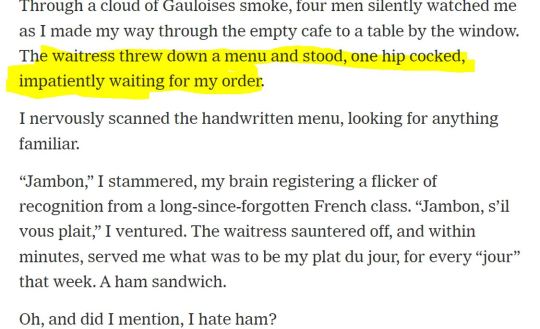
Quite a contrast to the dream version back home:
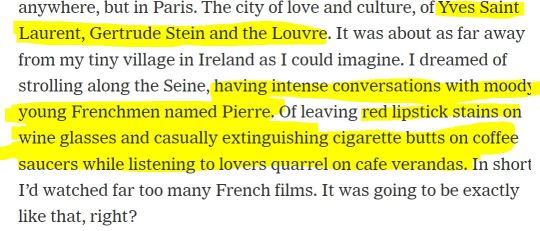
Touché. All the moody young Frenchmen are named Pierre, C. All. Of. Them. As for watching far too many French films, there's always been something very Nouvelle Vague about you, Jeanne Moreau and Jules et Jim & all that, and I have to say this is what I found immediately endearing. I am not talking about Claire Fraser: it is you, emphatically you. The kind of impeccably dressed woman one can find pretending to read Le Monde at Le Café de Flore's terrace in Saint-Germain-des-Prés. The kind of self-evident, celestial creature whose high heels are never heard on any pavement (what is your secret?). Late Jane Birkin didn't even come close, C., mark me. However, red lipstick stains look way better on the rim of a nervously half drunk cup of noisette coffee: but then, that is me.
It was not at all like that, of course, but then something happened just across the street from the Saint-Eustache church, at Quigley's Point, a long gone Irish pub I vaguely remember. Circa 1998, our own boisterous squad used to play darts and get plastered on cheap draft beer and that undignified, syrupy manzana Basque liqueur (idiots, I am telling you, but it was very cheap) at The Bombardier, on the Place du Panthéon, just across the Seine:

Thick brogue, a quick laugh, kind eyes and blonde hair. An interesting combo, for sure. No further comment except well, this is very personal, isn't it? You've said it yourself: sometimes (fun fact: always) the really important people have nothing to do with fantasies. But we know, C, we know.
And then, suddenly, it all falls into place: Stendhal would talk about a crystallization moment. It is that split-second when everything becomes very clear. A pact of sorts occurs and all barriers are lifted. For C, it happened in one of the perfect places of this planet, spare perhaps the Piazza del Campo, in Siena:

No doubt, by tomorrow evening at the latest, I will be crucified by Mordor, but this made me think of that - different setting and context, same type of seminal moment. Draw your own conclusions:
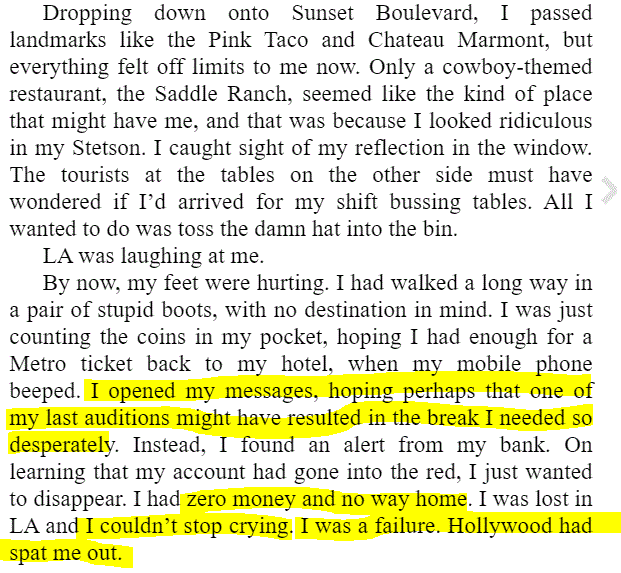
(SRH, Waypoints, Day Four: The Hard Road)
Important things happen, too, Place du Panthéon and this moved me to bits, even if this was not a happy ending. So shamelessly glad it wasn't, by the way:

For (and forgive me for ineptly tinkering with your words) "It’s true, you never forget your first love". And for that man on that random pavement in LA, that will always be you, passerby of the Place des Vosges. The wonder you are, despite anything else: it is perfectly irrelevant.
Jacques Brel says it best, in what is almost a prayer:
youtube
94 notes
·
View notes
Photo
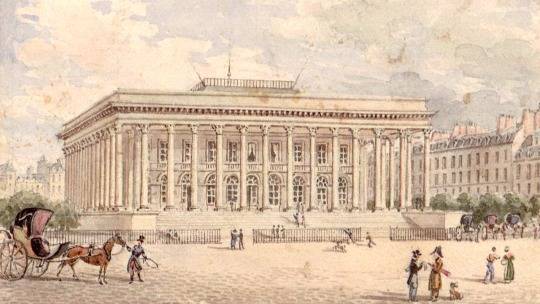
24 mars 1808 : pose de la première pierre de la Bourse, à Paris ➽ http://bit.ly/Construction-Bourse-Paris Malgré l’ordonnance de 1563 et l’arrêt du conseil du 24 septembre 1724, Paris n’avait point encore, d’une manière définitive et au début du XIXe siècle, sa Bourse, sa « loge de la Marchandise », comme en possédaient alors déjà Amsterdam, Venise, Londres, Saint-Pétersbourg, Vicence, Padoue, Brescia et les principales villes commerçantes de l’Europe
#CeJourLà#24Mars#Bourse#Paris#Palais#Architecte#Brongniart#Édifice#Monument#Construction#Édification#Loge#Marchandise#Villes#Commerce#Économie#Histoire#France
4 notes
·
View notes
Text

La petite île de Saint-Cado sur la commune de Belz, Bretagne - France
Ravissant hameau relié à la terre par un pont en pierre , très prisée des peintres et des photographes. Elle offre un superbe point de vue sur la ria d'Etel.
69 notes
·
View notes
Text
Les Misérables 1991
After the semi-failure of the very first show in 1980
Les Mis should have logically fallen into oblivion … Without the miraculous intervention of Cameron Mackintosh !!

While he had just inaugurated Cats on Broadway, the concept album of the show was sent to him by the director Peter Farago, who having seen the stage adaptation of Robert Hossein and and wanted to create an English adaptation
Mackintosh, initially reluctant eventually accepted the challenge
It took him two years of work in collaboration with Herbert Kretzmer, Siobhan Bracke and James Fenton
The first adaptation of a French musical to finally be created in London in October 1985 at the Barbican Centre before moving to the West End :
youtube
The HUGE success will lead to the production of a second official French version ( we can even consider it as a remake)
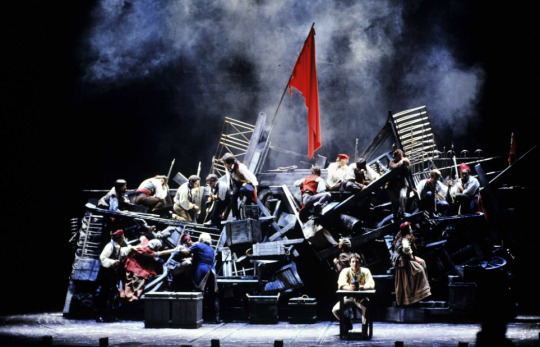
Because it would be stupid to change a winning team
Cameron Mackintosh will take the reins of the project ( with behind him the shadow of Alain Boublil who will have to RETRANSLATE Kretzmer's texts which are translations of his own texts )
it is he who will stage this new version closer to the English adaptation than to the original show
The show will be performed in Montreal at the Théâtre Saint-Denis then in Paris at the Théâtre Mogador

1991 full album :

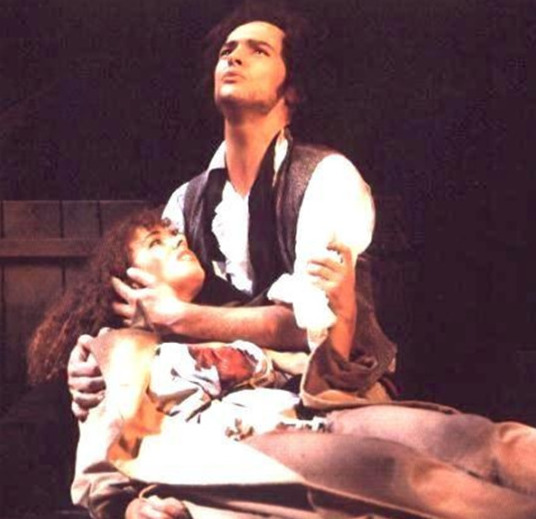
FRENCH DISTRIBUTION :
Robert Marien : Jean Valjean
Patrick Rocca : Javert
Louise Pitre : Fantine
Laurent Gendron : Mr Thénardier
Marie-France Roussel : Mrs Thénardier
Lynda Zaoui / Anne-Laure Grondin / Nora Kati / Aurélie Lebarbé / Marjorie Theillaumas / Karine Debec / Audrey Boitel : alternately little Cosette and little Eponine
Marie Zamora : Cosette
Stéphanie Martin : Éponine
Ludwig Briand / Cyrille Vannier / Alexis Tomassian : Gavroche
Jérôme Pradon : Marius
Julien Combey : Enjolras
Renaud Marx : Grantaire
Vincent Vittoz : Combeferre
Pierre-Yves Duchesne : Courfeyrac
Juan Pablo Armitano : Feuilly

CANADIAN DISTRIBUTION :
Robert Marien : Jean Valjean
Peter Zinko : Javert
Louise Pitre : Fantine
Andre Therrien : Mr Thénardier
Mireille Thibeault : Mrs Thénardier
Clotilde Aras / Adrienne Nye / Lily Russell / Aurelie Lebarbe / Marjorie Theillaumas / Anne-Laure Grondin : alternately little Cosette and little Eponine
Laur Fugère : Cosette
Stéphanie Martin : Éponine
Andrew Bauer-Gâdor / Gabriel Kakon : Gavroche
Frayne McCarthy : Marius
Francois Godin : Enjolras
Daniel Jean : Grantaire
Sébastien Dhavernas : Courfeyrac
Alexandre Beaulieu : Joly
Unlike the original show which had a lot of archive photos but few videos , here I was able to find more interesting materials :
The Full Live Recording of the Show :
youtube
youtube
youtube
youtube
youtube
youtube
youtube
Unfortunately ... the show is a resounding failure
Les Mis were snubbed for two reasons :
1 - France and musicals is an incredibly recent encounter !!
The public was not interested in this kind of entertainment, which was considered pedantic and unnecessarily expensive , it will be necessary to wait for "Notre Dame de Paris"
( ironically another musical based on a novel by Victor Hugo)
In 1999, for this kind of show to be adopted and appreciated by the public

2 - Fans of the first albums and shows felt betrayed
You have to understand that it is not easy to accept as a long-time fan that a work is cut or modified, while an Englishman allows himself to transform the songs and the scenography by declaring it superior ?!
( not to mention the Franco-English friend-enemy relationship which goes back a long way)
Hardcore fans took this as an affront and boycotted the show apparently, Cameron Mackintosh was so upset and disappointed by the situation that he declared France to be : "a musical graveyard" which only added to the public's bitterness
ANECDOTES :
I had already pointed out that in the 1980 version, Gavroche's actors often lent their voices to the world of dubbing coincidence ?
This is still the case here
youtube
The iconic voices of Alexis Tomassian
...
youtube
Ludwig Briand became a famous child actor playing the role of Mimi Siku in the CULT French comedy film : " Un indien dans la ville "
...
Francois Godin ( Canadian Enjolras ) is a renowned Quebec voice actor !!

By the time I start looking at the 2024 version
I invite you to visit my Masterlist ( with my other posts on les misérables + other french musicals :)
#les misérables#les mis#les miz#inspector javert#jean valjean#musical theater#gavroche#marius pontmercy#cosette#fantine les mis#eponine#victor hugo#one day more#do you hear the people sing#i dreamed a dream#notre dame de paris#cameron mackintosh#lea salonga#french musical#comédie musicale#enjolras#thenardier#the miz#les miserables#the miserables#paris france#doublage#french dub#musical#broadway musicals
6 notes
·
View notes
Note
Is there a list of frev figures who claimed to be at the storming of the Bastille? The people I know who said they at least witnessed it is pretty eclectic like Herault, Léon and Saint-Just.
I found all the (official?) ”vainqueurs de la Bastille” listed in alfabethical order here (1889). However, according to Michael J. Sydenham’s Léonard Bourdon: The Career of a Revolutionary, 1754-1807, who’s subject of study claimed to belong to this group, simply holding this title was not a guarantee that you had actually taken part in the storming itself:

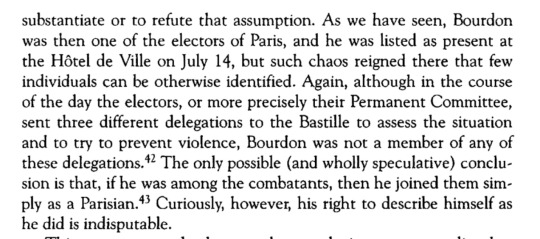
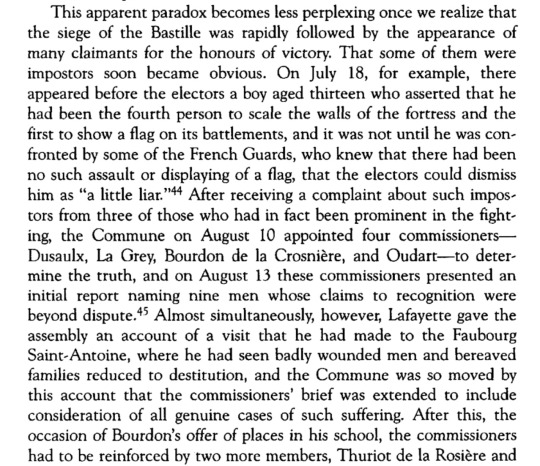

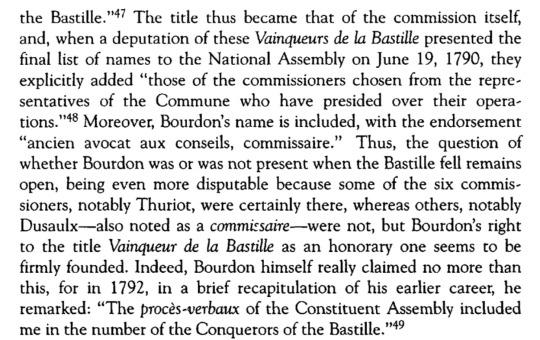
The only people found on the list that I myself recognized were those of the dantonist Louis Legendre, the girondin Claude Fauchet and the general Antoine Joseph Santerre. I therefore don’t know if the people claiming to have participated in the storming here below are just lying (saying you played a role in it after all being something that would easily better your patriotic reputation) or if their participation just wasn’t recorded (which doesn’t sound particulary hard to be true either):
Stanislas Fréron claims in a letter to Lucile Desmoulins dated October 18 1793, that both he, Barras and La Poype ”besieged” the Bastille.
Pierre Nicolas Berryer wrote in his memoirs that the Convention deputy Bourdon d’Oise participated in the storming of the Bastille, and still kept the blood stained coat he had worn during it five years later:
At the same time, and as if he felt the need to convince me even more of the strength of his mind, [Bourdon] took out from under his bed an oblong casket, in which was tucked the coat he had worn on the day of the storming of the Bastille… […] He took great care to point out to me that his coat was still covered with stains from the blood he had spilled at the Bastille.
Albert Mathiez summarized in the article La vie de Héron racontée par lui-même (1925) a memoir the Committee of General Security spy François Héron wrote while imprisoned after thermidor. In it, he would have claimed to have participated in the storming of the Bastille, as well as the women’s march on Versailles, the demonstration of June 20 and the Insurrection of August 10.
According to Dictionnaire des parlementaires français (…) de 1789 à 1889, Jacques-Alexis Thuriot took part in the storming.
Regarding some more well known guys and their Bastille activities, Desmoulins, in a letter written to his father written July 16, leaves a rather detailed description of the storming. Through the following part, he does however indicate that he himself missed it:
Then, the cannon of the French Guards made a breach. Bourgeois, soldiers, everyone rushes forward. An engraver climbs up first, they throw him down and break his legs. A luckier French guard followed him, seized a gunner, defended himself, and the place was stormed in half an hour. I started running at the first cannon shot, but the Bastille was already taken, in two and a half hours, a miracle that is.
Camille also adds that, on July 15, he was among the people who scaled the ruins of the stormed Bastille:
However, I felt even more joy the day before, when I climbed into the breach (montai sur la brèche) of the surrendered Bastille, and the flag of the Guards and the bourgeois militias was raised there. The most zealous patriots were there. We embraced each other, we kissed the hands of the French guards, crying with joy and intoxication.
On July 23 1789, Robespierre wrote a letter to Antoine Buissart telling him he had gotten to see the ”liberated” Bastille, but he had of course not participated in the storming himself:
I’ve seen the Bastille, I was taken there by a detachment of the brave bourgeois militia that had taken it; because after leaving town hall, on the day of the king's trip, the armed citizens took pleasure in escorting out of honor the deputies they met, and they could only march among acclamations from the people. What a delightful abode the Bastille has been since it came into the power of the people, its dungeons are empty and a multitude of workers work tirelessly to demolish this odious monument to tyranny! I could not tear myself away from this place, the sight of which only gives sensations of pleasure and ideas of liberty to all good citizens.
According to Danton: le mythe et l’histoire (2016), Danton did not take part in the actual storming of the Bastille, however, the following day he went to the abandoned prison and took the provisional governor hostage:
Absent from the storming of the Bastille, it was on the night of July 15 to 16 that Danton took action. At the head of a patrol of the bourgeois guard of his district, of which he proclaimed himself captain, he claimed, we do not know in what capacity, to enter the "castle of the Bastille,” placed under the control of the elector Soulès, as provisional governor. Without worrying about his powers, Danton has him kidnapped and taken to City Hall, surrounded by a threatening crowd. But Soulès was released the next day upon the intervention of La Fayette; Danton's initiative was openly disavowed and blamed by the assembly of electors.
According to Clifford D. Connor, Marat wrote the following about his activities on July 14 1789 in number 36 of l’Ami du peuple (12 November 1789):

#lots of thermidorians who were involved in the storming…#french revolution#frev#bastille#danton was really unhinged here…
27 notes
·
View notes
Text
Évangile de Jésus-Christ selon Saint Luc 5,1-11
« En ce temps-là,
1 la foule se pressait autour de Jésus pour écouter la parole de Dieu, tandis qu’il se tenait au bord du lac de Génésareth.
2 Il vit deux barques qui se trouvaient au bord du lac ; les pêcheurs en étaient descendus et lavaient leurs filets.
3 Jésus monta dans une des barques qui appartenait à Simon, et lui demanda de s’écarter un peu du rivage. Puis il s’assit et, de la barque, il enseignait les foules.
4 Quand il eut fini de parler, il dit à Simon : « Avance au large, et jetez vos filets pour la pêche. »
5 Simon lui répondit : « Maître, nous avons peiné toute la nuit sans rien prendre ; mais, sur ta parole, je vais jeter les filets. »
6 Et l’ayant fait, ils capturèrent une telle quantité de poissons que leurs filets allaient se déchirer.
7 Ils firent signe à leurs compagnons de l’autre barque de venir les aider. Ceux-ci vinrent, et ils remplirent les deux barques, à tel point qu’elles enfonçaient.
8 À cette vue, Simon-Pierre tomba aux genoux de Jésus, en disant : « Éloigne-toi de moi, Seigneur, car je suis un homme pécheur. »
9 En effet, un grand effroi l’avait saisi, lui et tous ceux qui étaient avec lui, devant la quantité de poissons qu’ils avaient pêchés ;
10 et de même Jacques et Jean, fils de Zébédée, les associés de Simon. Jésus dit à Simon : « Sois sans crainte, désormais ce sont des hommes que tu prendras. »
11 Alors ils ramenèrent les barques au rivage et, laissant tout, ils le suivirent. »
Texte biblique tiré de « La Bible — traduction officielle liturgique — AELF »)
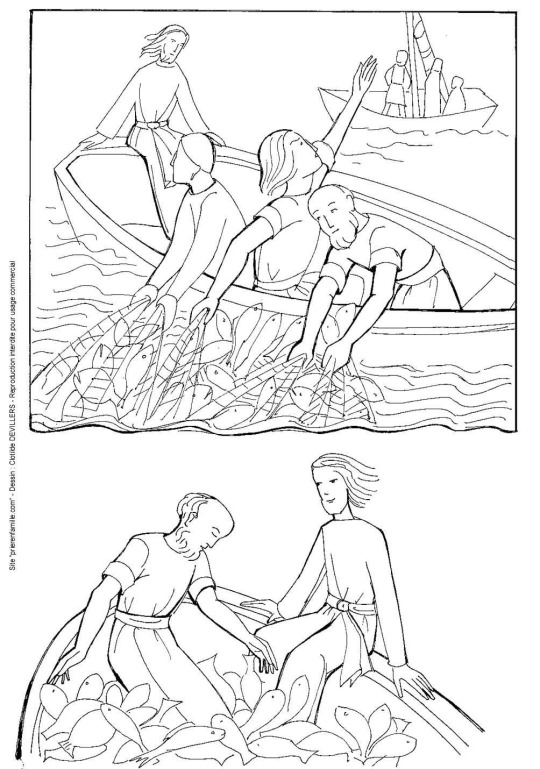
(Illustration du site Apprenez-nous à prier)
Commentaire Lc 5,4
« Avance au large, et jetez vos filets pour la pêche. » (Lc 5,4). À cette demande de Jésus à Pierre, les précisions apportées par Luc ne laissent aucun doute là-dessus : « Maître, nous avons peiné toute la nuit sans rien prendre », c’est le constat de Pierre, l’homme de métier. Puis, le succès inespéré de l’entreprise pourtant vouée à l’échec à vues humaines : si la pêche ne donne rien la nuit, elle a encore moins de chances d’être fructueuse le jour, tous les pêcheurs le disent ; mais sur la simple parole de Jésus, le miracle se produit : « Ils prirent une telle quantité de poissons que leurs filets se déchiraient. » Comme le prophète Isaïe, Pierre à la même réaction devant cette irruption de Dieu dans leur vie ; tous les deux ont une même conscience de la sainteté de Dieu et de l’abîme qui nous sépare de lui. Et leurs expressions à tous les deux se ressemblent beaucoup : « Seigneur, éloigne-toi de moi, car je suis un homme pécheur », dit Pierre ; et Isaïe disait « Malheur à moi ! je suis perdu, car je suis un homme aux lèvres impures, j’habite au milieu d’un peuple aux lèvres impures : et mes yeux ont vu le Roi, le SEIGNEUR de l’univers ! » Mais, apparemment, ce n’est pas notre péché, notre indignité qui arrête Dieu ! Il lui suffit que nous en prenions conscience, que nous soyons en vérité devant lui. Car le jour où nous prenons conscience de notre pauvreté, Dieu peut nous combler. Tous les deux, Pierre et Isaïe, sont donc en proie à une espèce de crainte devant la manifestation évidente de Dieu. Alors, toujours dans sa vision, Isaïe voit s’accomplir le geste qui le purifie et le rassure ; Pierre, lui, entend la parole de réconfort de Jésus : « Sois sans crainte ». Enfin, tous les deux reçoivent une vocation, au service du même projet de Dieu, bien sûr, qui est le salut des hommes. Isaïe sera un messager, un prophète. Pierre sera un pêcheur d’hommes, un « sauveteur ». « Ce sont des hommes que tu prendras » : en grec, le sens du mot employé ici est « prendre vivant » ; quand il s’agit de poissons, c’est le mot qu’on emploie pour la pêche au filet : capturer des poissons, les arracher à la mer, c’est les tuer parce que la mer est leur milieu naturel… Mais quand il s’agit des hommes que l’on arrache à la mer, il signifie sauver : prendre vivants des êtres humains, les arracher à la mer, c’est les empêcher de se noyer, c’est les sauver. Sur cette phrase de Jésus, « Sois sans crainte, désormais ce sont des hommes que tu prendras », Pierre ne répond pas ; la simplicité du texte est impressionnante : « Alors ils ramenèrent les barques au rivage et, laissant tout, ils le suivirent. » Encore faut-il s’entendre sur le sens du mot « suivre » : les disciples ne se contenteront pas de suivre le maître pour l’écouter ; ils seront associés à sa tâche, ils deviendront ses collaborateurs. Même si l’entreprise paraît vouée à l’échec à vues humaines, il faudra continuer à lancer les filets. Nous sommes placés là devant le mystère extraordinaire de notre collaboration à l’œuvre de Dieu : nous ne pouvons rien faire sans Dieu, mais Dieu ne veut rien faire sans nous. À ce maître qu’il vient d’entendre parler à la foule longuement, il fait confiance, assez pour l’écouter, assez pour se risquer à une nouvelle tentative de pêche ; après le miracle, il ne dit plus « Maître », il dit « Seigneur », le nom réservé à Dieu ; et c’est aux pieds du Seigneur qu’il se prosterne ; et alors il est prêt à entendre l’appel : pour se risquer à cette nouvelle sorte de pêche que lui propose Jésus, il faut le reconnaître comme le Seigneur. Pour que la pêche soit miraculeuse, il suffit de croire en Lui. (Note du P. Mario Doyle, C.Ss.R. : Ce commentaire reproduit largement celui d’une bibliste bien connue des catholiques de France : Marie Noëlle Thabut)
2 notes
·
View notes
Text

L'Officiel N°582 1971
Black double-breasted jacket with long pointed lapels and square shoulders is worn over pleated black crepe shorts. Saint Laurent Rive Gauche model. Saint Laurent shoes and jewelry, Alexandre de Paris wig. The automodule is by Jean-Pierre Ponthieu.
Veston croisé noir à longs revers pointus et épaules carrées est porté sur un short plissé en crêpe noir. Modèle Saint Laurent Rive Gauche. Chaussures et bijoux Saint Laurent, perruque Alexandre de Paris. L'automodule est de Jean-Pierre Ponthieu.
Photo Roland Bianchini
#l'officiel#1971#fashion 70s#spring summer#printemps été#ready to wear#prêt à porter#yves saint laurent rive gauche#ysl#roland bianchini#alexandre de paris#jean-pierre ponthieu#vintage magazine#vintage fashion
4 notes
·
View notes
Text
Ils parlent de la mode

Yves Saint-Laurent par Jeanloup Sieff, 1971
1. « La mode passe, le style reste » - Yves Saint-Laurent
2. « Etre un pas en avance sur la tendance de la mode n’est pas si important pour moi. Ce qui compte, c’est toujours aller de l’avant » - Sonia Rykiel
3. « Si tu ne peux pas être mieux que la concurrence, il suffit de t’habiller mieux » - Anna Wintour
4. « Ce n’est pas la robe que vous portez qui compte, mais la vie que vous menez en la portant » - Diana Vreelan
5. « La plus grande élégance, c’est la vérité » - Thierry Mugler

Giorgio Armani
6. « L’élégance ce n’est pas se démarquer, mais être mémorable » - Giorgio Armani
7. « Les femmes nulles suivent la mode, les prétentieuses l’exagèrent, mais les femmes de goût pactisent agréablement avec elle » - Marquise du Châtelet
8. « Les vêtements que je préfère sont ceux que j’invente pour une vie qui n’existe pas encore, le monde de demain » - Pierre Cardin
9. « Vaines bagatelles qu’ils semblent être, les vêtements ont, disent-ils, un destin plus important que de nous tenir chaud. Ils changent notre vision du monde et le point de vue du monde sur nous » - Virginia Woolf
10. « La mode me dépasse. Mon imaginaire dépasse les limites normales et m’entraîne où je ne voudrais pas aller » - Yves Saint-Laurent

Jane Birkin
11. « Mon style est comme un cocktail. Je ne suis pas aussi apprêtée qu’une française mais je m’en fiche comme une anglaise » - Jane Birkin
12. « La mode est avant tout un art du changement » - John Galliano
13. « La chose la plus difficile dans la mode n’est pas d’être connu pour un logo, mais d’être connu pour une silhouette » - Giambattista Valli
14. « Donne à une fille les bonnes chaussures et elle peut conquérir le monde » - Marylin Monroe
15. « Pour être irremplaçable, il faut être différente » - Coco Chanel
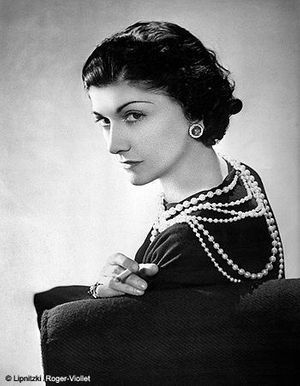
Coco Chanel
16. « On est jamais trop, ni pas assez habillé avec une Petite Robe Noire» - Karl Lagerfeld
17. « La mode n’est pas quelque chose qui existe uniquement dans les vêtements. La mode est dans l’air, portée par le vent. On la devine. La mode est dans le ciel, dans la rue. » - Coco Chanel
18. « L’élégance est la seule beauté qui ne se fane jamais » - Audrey Hepburn
19. « J’aime être une femme, même dans un monde d’hommes. Après tout, les hommes ne peuvent pas porter de robes, mais nous pouvons porter des pantalons » - Whitney Houston
20. « J’aime mon argent quand il est là où je peux le voir : sur des cintres, dans mon armoire » - Carrie Bradshaw

Carrie Bradshaw dans Sex & The City
21. « La femme à la mode porte le vêtement. Ce n’est pas le vêtement qui la porte » - Mary Quant
22. « Les femmes s'habillent pour elles-mêmes. Si elles s'habillaient pour les hommes, elles seraient tout le temps nues » - Betsey Johnson
23. « La mode est ce que vous offrent les créateurs quatre fois par an. Le style est ce que vous choisissez » - Lauren Hutton
24. « La différence entre le style et la mode est la qualité » - Giorgio Armani
25. « Ne soyez pas dans les tendances. Ne laissez pas la mode s’emparer de vous, mais décidez de ce que vous êtes, de ce que voulez exprimer par ce que vous portez et de la façon dont vous vivez » - Gianni Versace

Gianni et Donatella Versace
26. « La mode doit être une forme d’échappatoire, et non une forme d’emprisonnement » - Alexander McQueen
27. « La moitié de mes créations sont de la fantaisie contrôlée, 15 % de la folie pure, et le reste du terre-à-terre » - Manolo Blahnik

28. « La seule vraie élégance est dans l’esprit; si vous avez ça, le reste vient vraiment de ça » -Diana Vreeland
29. « Je ne crée par des vêtements, je crée des rêves » - Ralph Lauren
30. « Au fil des années j’ai appris que ce qui est important dans une robe, c’est la femme qui la porte » - Yves Saint Laurent
31. « Les hommes me disent que j’ai sauvé leur mariage. Cela leur coûte une fortune en chaussures, mais moins cher qu’un divorce » - Manolo Blahnik
32. « Les vêtements ne vont pas changer le monde, les femmes qui les portent, si » - Anne Klein
33. « Quand vous doutez, portez du rouge » - Bill Blass
34. « La mode est un langage de l’instant » - Miuccia Prada
35. « J’adore et j’admire tous ceux qui sont différents. J’aime ça. Le jet set est banal. Le bon goût est banal. L’excentricité est chic. Le bon goût paralyse. Mais la mode du punk ou de la rue ou un corps couvert de tatouage c’est intéressant pour moi et j’adore » - Jean-Paul Gaultier

36. « Ne jamais dire jamais – dans la mode et dans la vie » - Ashley Olsen
37. « La seule raison pour laquelle je suis dans la mode est de détruire le mot conformité » - Vivienne Westwood
38. « Il n’y a pas de mode si elle ne descend pas dans la rue » - Coco Chanel
39. «L’élégance est une question de personnalité plus que de vêtements » - Jean-Paul Gaultier
40. «Une belle robe, c’est une comédienne qui parle juste » - Sonia Rykiel

41. « La mode se démode, l’allure est intemporelle » - Coco Chanel
42. « Les gens de la mode n’aiment que ce qu’ils ne comprennent pas. Alors il suffit de faire un truc incompréhensible et ils t’adorent » - Loïc Prigent
43. « La mode est ce que l'on porte. Ce qui est démodé, c'est ce que portent les autres » - Oscar Wilde
44. « Le style est une manière de dire qui vous êtes sans parler » - Rachel Zoe
45. « Le style sait qui vous êtes, ce que vous voulez dire, et ce dont vous vous fichez » - Orson Wells
46. « Effacez le négatif, accentuez le positif. » - Donna Karan
47. « C’est l’attitude qui fait tout. » - Diane von Furstenberg

48. « Une femme doit être deux choses : classe et fabuleuse. » - Coco Chanel
49. « La mode est ce que vous offrent les créateurs quatre fois par an. Le style est ce que vous choisissez. » - Lauren Hutton
50. « La simplicité est l’ultime sophistication » - Léonard de Vinci
14 notes
·
View notes
Text
Suchet and Soult, 1813
That Napoleon’s marshals in Spain most of the time were busy being at odds with each other is well-known. Marshals Soult and Suchet were no exception. Suchet in particular seems to have rather disliked Soult, if it is true that as early as 1805 he specifically wanted to leave Soult’s army corps and had himself be transferred to Lannes’ instead. Their relations probably did not get much better in Spain, considering the animosity between Joseph and Soult, and Suchet’s close family relations with Joseph.
Suchet seems to have had a bit of a reputation for being the jealous kind. In any case, if this scene from 1813 is to be believed, he was not ready to be under the command of Soult under any circumstances, not even for the sake of France. It’s from the "Mémoires anecdotiques" by general Armand Alexandre Hippolyte Marquis de Bonneval, whose author had become Soult’s aide de camp quite against his will, but apparently, by the time they reached Spain, despite himself was already fully included in his military family.
Context: After an insuccessful attempt to save Pamplona, Soult, rather belatedly charged by Napoleon to take full command in Spain in summer 1813, when Joseph had lost the battle of Vitoria, wanted to unite what was left of Joseph’s forces with those still under the command of Marshal Suchet, in order to defend France’s borders from Wellington’s approaching army. He thus needed to contact Suchet in Catalonia. Bonneval writes:
I was entrusted with this mission and went via Perpignan to Barcelona, where Marshall Suchet was. He listened to me with complacency; then, after having discussed at length the arrangements to be made to effect this junction, he declared it necessary to make a movement in the direction of Valencia to sweep away the Spanish armies and thus ensure the safety of the portion of his army he would leave in Catalonia. So we set off, and having achieved the goal Marshal Suchet had in mind, we returned to Barcelona.
And it was on the journey back that Soult’s idea was discussed once more.
While riding side by side with me, Marshal Suchet asked me: "What will my position be with regard to Marshal Soult, Monsieur de Bonneval?" - "But," I replied, "Monsieur le maréchal, it can only be, in any case, that of a marshal of the Empire; however, if Your Excellency asks me if Marshal Soult will be willing to give up his position of seniority and lieutenant of the Emperor, my mission does not go as far as that." The marshal turned very cold and stopped talking to me.
As a matter of fact, according to Bonneval, Suchet at this point had decided that Soult’s plan was "untimely and inconvenient". Bonneval tried to talk him out of that, but in vain.
He persisted; and I saw that there was nothing to do but to take leave of him and return to Marshal Soult. On arriving at Saint-Jean de Luz, at about 2 o'clock in the morning, I found my comrades at table over champagne and oysters. They all stood up and invited me to join in the feast.
Because apparently, even without the original line-up of Saint-Chamans, Lameth, Soult’s brother Pierre etc., the tradition of all-night parties was still kept alive.
"I shall return to you shortly," I told them, "but first I must go and make the Marshal swallow the biggest of all oysters." When I arrived at his place, Marshal Soult was awake; in fact, he never slept with more than one eye closed. "Ah! it's you, my dear Bonneval," he said to me. "Is Marshal Suchet on his way?"- "He is still in Barcelona, Monsieur le Maréchal, certainly sleeping better than you." And I gave him all the details of my failure. He then burst into a holy rage against the foolish pride and ineptitude of the Duke of Albufera, throwing his cap at the ceiling and hurling the foulest words in his vocabulary. Then, calmer again: "Go and rest, my dear friend," he said. I went straight to the oysters and champagne.
That last sentence is just 😂. Obviously, everybody had their priorities straight.
Interestingly enough, Bonneval later, like Saint-Chamans, would become a staunch royalist and have a fall-out with Soult for political reasons. Yet he apparently always held Soult in high esteem personally, and claims to always have hoped Soult would "see reason" and "return to the path of honour", i.e., to the cause of the older branch of Bourbons.
24 notes
·
View notes
Text
Why was Carnot so vehement in repressing the Babouvists while protecting or even wanting to collaborate with some (theories)?
We have seen here that Carnot was one of the main figures behind the repression of the Babouvists, as seen here: https://www.tumblr.com/nesiacha/767944757763883008/babeuf-et-la-r%C3%A9publique-pers%C3%A9e?source=share, wanting to expand arrests to the maximum while protecting some of the Babouvists like Felix Le Peletier (a very close friend of Gracchus Babeuf and protector of Babeuf's family after his death), who had an ambiguous political relationship with Carnot to the point where Carnot protected him and sometimes wanted them to work together https://www.tumblr.com/nesiacha/770487228804759553/f%C3%A9lix-lepeletier-de-saint-fargeau-un-personnage?source=share. If you want to know more about Gracchus Babeuf, including some of my theories, please consult here https://www.tumblr.com/nesiacha/768437156389715968/in-honor-of-gracchus-babeufs-recent-anniversary?source=share, and feel free to correct me, I’m not infallible.
First theory.
At first glance, this seems implausible. And it is indeed a mystery. However, I believe there are some theories that might explain why Carnot was truly after Gracchus Babeuf. Babeuf was one of those who wanted a certain redistribution of property, especially in the agrarian sense (though this is still unclear, and we can’t really talk about communism because Babeuf seemed unaware of the rise of capitalist societies). However, he is one of the rare revolutionaries who began to advocate for the redistribution of property rights.
One of the major revolutionaries who also started theorizing the right to redistribute property was Momoro. Momoro, along with Ronsin, was one of the leaders of the Hébertists. In fact, Momoro had issues with this in Normandy. Here is an excerpt: “On August 30, the Directory of the Department of Paris sent him, accompanied by a certain Jean-Michel Dufour, representing the Commune, to supervise mass levies in Normandy. They arrived in Bernay on September 7, where Momoro immediately made a vehement speech to the assembly of the Department of Eure. On this occasion, they distributed copies of the Declaration of the Rights of Man and Citizen, with two additional articles of their own, sowing doubt about the inviolability of private property, which, according to them, was ‘guaranteed until the nation has established laws on the matter.’ This, of course, sparked a fierce reaction from the rural population, very attached to land ownership! The next day, they were ‘booed, insulted, disarmed,’ and treated as ‘incendiaries and seditious.’ They owed their safety only to the authority of the president of the Department’s assembly, the Girondin deputy François Buzot, who was eager to restore peace to his district. Freed, they were escorted to Lisieux. The incident made waves in the department and had some repercussions in Paris, especially under Buzot’s influence, who was determined to make Momoro pay for the disorder caused in his district. In the October 12 session of the newly established National Convention, he personally attacked ‘the man I saved from the fury of the people, to whom this wretched man preached the division of land.’ Momoro and Dufour were recalled to Paris, and on September 23, the department’s public prosecutor thanked the Minister of the Interior, Jean-Marie Roland, as these individuals ‘had conducted themselves in a manner more likely to incite trouble than to propagate respect for property and personal safety.’” (Excerpt from Jean-Pierre Duquesne, confirmed by Grace Phelan since Jean Pierre Duquesne is not reliable at times but Grace Phelan does more correct work ).
In fact, those who proposed any significant challenge to property rights were often put in the minority, even within the Enragés or Hébertists, who focused more on economic issues like the maximum price law. There was a real fear of any attack on property rights, a fear heavily played upon by the Directory, including by Sieyès. One pretext was the closure of the neo-Jacobin club, which gathered figures like Prieur de la Marne, Xavier Audouin, Topino-Lebrun, Felix Le Peletier, Victor Bach, Antonelle, Jean Baptiste Drouet, René Vatar, and adjudant Jorry, among others. Following Victor Bach’s speech and the resurgence of the left in 1799, Poultier in his journal L’Ami des lois accused Victor Bach of advocating for an agrarian law. According to Bernard Gainot’s investigation into Victor Bach’s mysterious death, this led to a "Jacobine conspiracy" being staged by Sieyès and Lucien Bonaparte. The speech of Bach, as interpreted by his critics (presenting a “project for a constitution” which proposed a social program close to Babeuf’s system), was a true provocation. It provided conservatives with the perfect opportunity to demonstrate to the majority of deputies (who held police powers over the Tuileries buildings, including the Manège hall) that the neo-Jacobins, contrary to their legalistic demonstrations, only sought the overthrow of the Constitution of Year III and the abolition of private property (or more precisely, a "leveling" of wealth). By wielding the "red peril" scare, this provided an opportunity to close the Manège Hall and ruin the democratic strategy gathered around the Journal des Hommes libres, which aimed to unite militant networks from Paris and the provinces to form a majority in the Councils capable of gradually amending the Constitution of Year III into a "representative democracy."
What is the link to Carnot? Simply that Carnot was maybe likely part of this larger political class, more numerous than we once thought (without excusing Carnot, of course, and avoiding the false excuse of "it was his time"), which feared the agrarian law. Gracchus Babeuf had promoted this law a few years earlier, while Felix Le Peletier was more vague about it, perhaps intentionally, to better rally people, whether on property rights or progressive taxation, even though reform demands were there. (Felix Le Peletier later used the same tactic in the Manège club, where Victor Bach was more precise in his demands, showing Felix Le Peletier to be more prudent or strategic in gathering support.) Therefore, for Carnot, Felix Le Peletier, by his attitude, was less "suspicious" than Gracchus Babeuf.
Second theory.
The second theory I find plausible: Babeuf’s proximity to the Hébertists (Gracchus Babeuf had connections with many left-wing figures, including Albertine Marat, Robert Lindet, Jean-Paul Marat, the Robespierrists such as the Duplays, and even the widow of Chaumette, Pierre-Gaspard Chaumette, Jean-Nicolas Pache, former mayor of Paris, and even people like Vadier). Among these Hébertists, some had problems with the Committee of Public Safety, the General Security Committee, or the Convention. Two names that came up are Clémence and Marchand, who were imprisoned and later released in Year II. Joseph Bodson, one of Babeuf’s most important “lieutenants,” was a fervent Hébertist who resented members of the CPS, including Robespierre, for having executed Chaumette and Hébert (while Gracchus Babeuf became a Robespierrist at the end of his life). Rossignol, one of Ronsin's friends, was also involved in the Conspiracy of Equals. At this time, Carnot was part of the Committee of Public Safety. When he saw the names of these individuals again during his time as Director of the Directory, perhaps this raised a "red flag" for him. Here was Gracchus Babeuf, who had once been close to the Hébertists, surrounded by elements that had had conflicts with the government where Carnot held important positions. We know that Carnot was not close to the Hébertists, and vice versa. This likely didn’t help Carnot view Babeuf favorably, as he was surrounded by individuals Carnot mistrusted (it’s not a simple "good Hébertists vs. bad Carnot and CPS members," or good Carnot and CPS members vs Hebertists—it’s more complex).
@aedesluminis mentioned a letter Carnot wrote to Garrau, a very loyal Jacobin who remained a friend of Carnot during the Directory. Garrau warned him about a potential royalist threat, but Carnot replied, dismissing it as no threat and stating he was more concerned about the danger of extremists from the left—the Babeuf faction in this case. We know that Carnot made significant political errors, and one of them was overestimating the danger from the left while underestimating the royalists.
According to historian Claude Mazauric, Carnot was the most fervent advocate of Babouvist repression, wanting to extend many arrests, though it seems he paradoxically protected Felix Le Peletier and other figures. Barras had reservations about this (one of the rare good actions from Barras in this case). However, according to Fouché’s memoirs, Barras might have been more responsible for the repression of the Babouvists than Claude Mazauric suggests. Fouché reportedly convinced Barras that Gracchus Babeuf (who had long since broken with Fouché) was a threat. This is plausible, especially when we realize how much harm Fouché did to the Babeuf family once he became Minister of Police. He listed Gracchus Babeuf’s widow, Marie-Anne Babeuf, in the list of Jacobins to be arrested in 1801, at a time when Jacobins were despised and victims of violence following the royalist-provoked Saint-Nicaise Street bombing. And in 1808, during the Malet Conspiracy, Fouché, now Minister of Police, ordered the arrest of Emile Babeuf, who only escaped because he was abroad due to work, while Marie-Anne Babeuf underwent a harsh interrogation (though she was known for her strong character and probably wasn't intimidated, given that she had survived worse trials, notably under the Directory). It’s chilling to think that, during a time when Gracchus Babeuf mistakenly thought of Fouché as a friend, he once wrote that he trusted Fouché with his children, as you can see in this post here: https://www.tumblr.com/nesiacha/770322937812336640/one-of-the-creepiest-things-among-the-many?source=share.
However, there’s a big "but." For now, I have only the version from historian Claude Mazauric and Fouché’s memoirs, which are sometimes unreliable (understatement). So, while I have no affection for Barras, I’m more inclined to believe Mazauric unless other elements come to corroborate it. Although when Fouché speaks of the agrarian law to scare people, it seems very plausible. Knowing Fouché, who showed no mercy to those who became his enemies (and after all, Gracchus Babeuf publicly denounced him in his journal), this could be true.
Why was Gracchus Babeuf executed along with Darthé?
Gracchus Babeuf, in my view, put forward a defense of rupture, at least initially, as you can see here: https://www.tumblr.com/nesiacha/764082552563761152/three-brave-defenses-by-revolutionaries-tried?source=share. For those who don't want to visit the link, here’s what Babeuf did: He showed remarkable courage, taking full responsibility for the "Society of Democrats," acknowledging all attacks against the Directory, stating, "The decision of the jurors will solve this problem...: will France remain a Republic, or will it return to a monarchy?" Babeuf fought, refused to answer, and contested many points. He was sentenced to death with Darthé (who remained stoic and mute, refusing to answer questions). Some say Charles Germain almost got the death sentence, but he was finally sentenced to deportation .
Gracchus may have been condemned to death as the leader of the Conjuration of Equals. His defense saved many of his colleagues, but it wasn’t the only reason why other co-defendants avoided execution. Babeuf's trial is well-known thanks to Pierre-Nicolas Hésine, a revolutionary who sheltered the Babeuf family during the trial and published Le Journal de la Haute-Cour or L’Echo des Hommes Sensibles et Vrais throughout the trial. The terrible journey in the iron cage from Paris to Vendôme, where the trial took place, moved public opinion. Teresa Poggi, Philippe Buonarroti’s partner, and Marie-Anne Babeuf, who was pregnant, made the journey on foot under arduous conditions for support the two mans.
Antonelle wasn’t idle in trying to save his co-defendants, although he distanced himself from Gracchus Babeuf due to Babeuf’s irresponsible attitude and their differences on certain issues. Gracchus made foolish moves, like leaving a list of people associated with him in his room, which Pierre Serna suggests was child's play for the police to find. According to Laura Mason, the police found hundreds of documents in an apartment near the center of Paris, including underground pamphlets, insurrection decrees, and instructions to confederates to incite rebellion. Gracchus was irresponsible in this regard, which greatly frustrated his more sensible comrade Antonelle. Antonelle distanced himself, particularly on how to achieve the revolution. I simplify, but for this noble revolutionary, the revolution should be saved through the ballot box and by fighting the system from within, though history would prove him wrong. Here's what Antonelle wrote: "The act of insurrection is the dream of a sick man… The more I think about this too frivolous subject, the more I remain convinced that this great conspiracy was reduced to the petty annoyances of a few disgruntled minds, the pastimes of some idle people who shared their thoughts." The problem was also that Gracchus didn’t take the necessary measures for a clandestine operation, inadvertently putting many involved—whether directly or indirectly—in danger.
But Antonelle, in his journal, also fought to save as many of the co-defendants as possible.
Here is an excerpt from Pierre Serna: "He participated in the Vendôme trial against Babeuf’s accomplices and played a key role in saving almost all of the defendants ».
Réal was also active, just like Vatar and Lebois, in defending the co-defendants (Vatar and Lebois had, a few years earlier, campaigned for the release of Marie-Anne Babeuf, who had been arrested for handling the subscriptions of her husband’s journal. Her arrest lasted only two days thanks to them, according to what I understand).
Moreover, among the co-defendants was an important figure who couldn’t possibly be dead, as he played a symbolic and crucial role in being one of the men who arrested Louis XVI: Jean-Baptiste Drouet. Even some reactionaries panicked when they saw his name among the list of co-defendants in the Babeuf trial, even though others supported the accusation.
Here are some excerpts about Jean-Baptiste Drouet: 'The submission of J.-B. Drouet's case to the Legislative Body in the summer of 1796 crystallized the anger of the democrats. From the moment the Council of Five Hundred began debating the inviolability of the deputy, the press entirely lost interest in other aspects of the case. On the day of Drouet’s arrest, the Directory declared that the police had apprehended him in the act of conspiracy. The democrats now demanded evidence that could justify the imprisonment and trial of a sitting deputy. Drouet claimed he had been arrested while meeting political allies to discuss an official letter he was drafting. The police report, his defenders pointed out, confirmed his statement, as it only mentioned the letter from Drouet and commercial documents belonging to the host of the meeting. 'Thus, in the eyes of the commissioner and his assistants, there were no actions, words, or writings that externally indicated any kind of conspiracy; therefore, there was no flagrant crime.' If Drouet had not been arrested in the act of conspiracy, the Directory had violated his inviolability, thus violating the constitution. If the Legislative Body repeated this act by allowing a trial, it would likewise violate the constitution. 'If the constitution is violated by its main guardians, all is lost; for, how can you punish a man who has conspired against the constitution if you are the first violators?' Didn’t the Terror originate from such violations?’
None of the arguments from Lamarque, nor from the other defenders of Drouet, managed to influence the Legislative Body. The Council of Five Hundred allowed the case to go to the Council of Ancients, which voted for a trial and set up a high court authorized to judge a representative of the people. Insulted but not defeated, the democratic press continued to defend Drouet by publishing speeches, letters, and satires. Méhée even offered to defend Drouet, fearing that more qualified men, faced with the threat of royalist violence, would hesitate to offer their services.
While the democrats focused on the trial, news spread that Drouet had escaped and disappeared. Drouet was able to flee because his case had become too embarrassing for the Directory. The Directory, which had arrested the conspirators denounced by Grisel, had assumed that the case would be widely approved, without considering the obstacle presented by the reputation of the man who had arrested the king at Varennes. Despite irrefutable evidence, despite Grisel’s denunciation, and especially despite the fact that the two chambers of the Legislative Body, by a large majority, had approved the trial, the charges against Drouet continued to provoke the anger of the democrats. Perhaps the Directors hoped that by letting Drouet escape, they would shift attention back to Babeuf, a less credible figure, and thus achieve the glory they expected from his prosecution.
However, the escape came too late. Fearing that the prosecutions against Drouet and the harassment of other democrats signaled a new reaction, and convinced that the Directors had violated the constitution, the democrats were determined to follow the trial of Babeuf closely. This trial, which involved a total of sixty-three other defendants, lasted three months, from the winter of 1796 to the spring of 1797, and became a fierce battle between the Directors and their democratic opponents. During longer and more radically covered proceedings than any other trial during the French Revolution, each side accused the other of betraying the promises of the Revolution, presenting its members as the heralds of the only true Republic.' (Excerpt from the article by Laura Mason, "After the Conspiracy: the Directory, the Press, and the Affair of the Equals")
So here we see that the press, the impact of the democrats, and certain prisoners influenced the judgment, in addition to Gracchus’s defense. I think we can now understand why only Gracchus and Darthé were executed. Between Gracchus’s defense, where he fought fiercely to at least save as many of his colleagues as possible, and Darthé, who was stoic and did not respond (Gracchus and Darthé knew they were going to die, as they spent their time sharpening a blade to attempt suicide), the fact that Gracchus was among those revolutionaries advocating for the infringement of property rights through agrarian reforms (a small group of revolutionaries who scared many political factions, whether in 1789, 1792, or even more so under the Directory) likely worked against him.
As for Carnot, the fact that Gracchus was part of this group of revolutionaries who surrounded themselves with people who had had problems with the Committee of Public Safety in 1794, as we saw, must have made his case even more difficult in Carnot’s eyes. Nevertheless, even in his repression of the Babouvists, Carnot did try to save some revolutionaries, as we saw in the case of Félix Le Peletier, which is to his credit.
What I found admirable in Gracchus, however, is that while he had every right to be angry with Carnot, especially regarding the terrible ordeal of the iron cage in Paris during the Vendôme trial, Babeuf refused to lump Carnot together with Barras and others. Gracchus only made a few moderate criticisms of him, even though he had every right to be furious. I feel that Gracchus, though unable to forgive, could understand someone who committed condemnable acts, provided that person was devoted to the Republic, which was the case with Carnot, whereas Gracchus never forgave people like Tallien, Barras, or Fouché and denounced them rightly and loudly.
After the repression of the Babouvists, according to Mazauric, Carnot, though conservative on many issues, slowed down the repressive zeal of Merlin. I think Carnot realized he had made a grave mistake. But we cannot know for sure unless we contact a good medium.
At the bottom is the screenshot that @aedesluminis found from Fouché’s memoirs about Babeuf and Barras

P.S:Feel free to contradict me or add theories again because it's interesting to add evidence or discuss it.
8 notes
·
View notes
Text

Lettre ouverte à la rédaction et aux lecteurs du magazine «Le Point» suite à l’article de Patrick Besson «Pourquoi il faut doter l’Ukraine de l’arme nucléaire» paru dans le numéro du 28 juin 2024 C’est avec une grande consternation que nous avons pris connaissance de l’article de Patrick Besson dans lequel il énonce une idée outrancière de fournir une bombe atomique au régime de Kiev pour frapper Moscou et Saint-Pétersbourg. Ainsi, sur les pages de l’hebdomadaire considéré réputé, le journaliste, consciemment ou pas, appelle au déclenchement d’une guerre nucléaire pour, comme il le croit, faire la paix. Pourtant, il faut retenir bien que dans cette guerre il n’y aurait jamais de vainqueurs car l’existence même de l’humanité serait mise en question.
D’ailleurs, avant de projeter maladroitement sur le présent des références douteuses et impertinentes au passé de la Russie des XVIII, XIX et XX siècles, M.Besson ferait mieux de se tourner vers l’histoire de l’Europe occidentale, y compris celle de la France, riche en évènements d’une extrême violence qui dépassent largement des clichés actuelles.
En ce qui concerne la présentation superficielle et partielle de Saint-Pétersbourg comme une nouvelle capitale russe «élevée par Pierre Ier au prix de milliers de travailleurs immigrés morts» il est à rappeler que cette ville a été construite grâce à l’enthousiasme de son fondateur Pierre le Grand et à l’abnégation des milliers de russes. Il est à rappeler que parmi les soi-disant «immigrés», qui ont eu le privilège d’investir leur talent et expérience dans ce projet pharaonique, figuraient de nombreux architectes français et italiens avec les noms immortels dont Auguste de Montferrand, Jean-François Thomas de Thomon, Domenico Trezzini, Carlo Rossi, Francesco Bartolomeo Rastrelli.
La liberté de parole va de pair avec la responsabilité pour leur sens.
5 notes
·
View notes